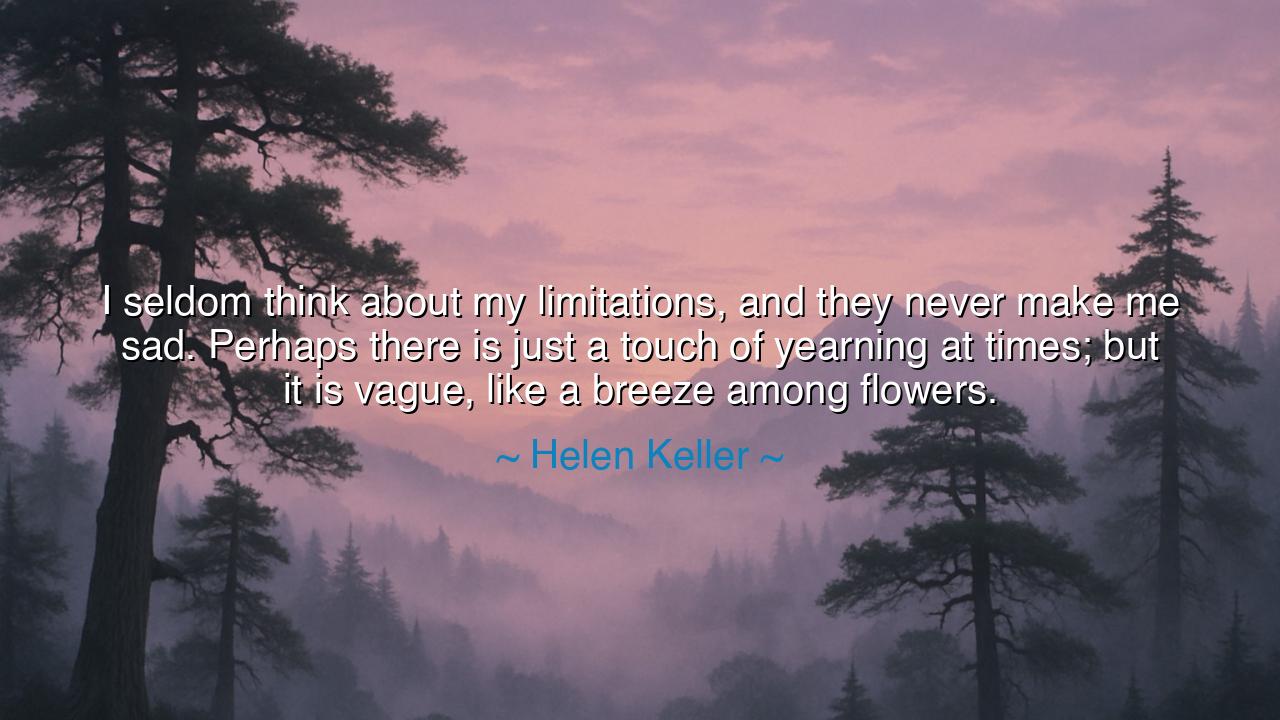
I seldom think about my limitations, and they never make me sad.
I seldom think about my limitations, and they never make me sad. Perhaps there is just a touch of yearning at times; but it is vague, like a breeze among flowers.






The luminous words of Helen Keller, “I seldom think about my limitations, and they never make me sad. Perhaps there is just a touch of yearning at times; but it is vague, like a breeze among flowers,” shine like a flame against the darkness of despair. They were spoken by a woman who knew both silence and blindness, yet whose spirit saw farther and heard more deeply than most who walk in light. In her words lies a truth of immortal power — that limitations are not chains, but challenges; not curses, but invitations to discover the boundless within oneself.
The ancients would have revered Helen as one touched by divine insight. For to live without sight or sound, and yet speak of peace and beauty, is to dwell near the realm of the sages. When she says she seldom thinks of her limitations, she is not denying their existence; she is transcending them. Her wisdom teaches that sorrow does not come from what is absent, but from where one chooses to place one’s gaze. If one’s eyes — or heart — remain fixed on what cannot be done, despair grows. But if one turns toward what can be created, what can be felt, what can be given, then even the darkest life becomes radiant with meaning.
Her “touch of yearning,” she admits, still exists — yet it is “like a breeze among flowers.” What a gentle image! It tells us that longing, too, can be soft and beautiful when it is not allowed to rule the soul. Yearning, to Helen, was not a storm that tore her spirit apart; it was a whisper that reminded her of the vastness of life’s possibilities. Even her sadness was transformed into grace. The breeze does not destroy the flower — it stirs it, reminding it to breathe. So too does longing remind us that the human heart is alive and ever-reaching, even in stillness.
Consider the story of Epictetus, the Stoic philosopher who was born a slave and crippled by his master. Yet he, too, taught that the body’s condition does not determine the soul’s freedom. “It is not things that trouble us,” he said, “but the view we take of them.” Helen Keller lived this truth centuries later. Where others might have seen only blindness, she perceived possibility. Her limitations became her discipline, her silence her music, her darkness her teacher. She, like Epictetus, proved that the greatest sight is inward — the vision of courage, purpose, and peace.
Through her words, Helen also teaches the art of acceptance — not as surrender, but as mastery. The wise do not resist their fate; they reshape it. To dwell on limitation is to be bound by it, but to accept it with serenity is to turn it into strength. In her serenity, Helen became a beacon to millions. Her example reminds us that happiness does not bloom from perfection, but from harmony between what is and what may yet be. She found joy not by escaping her reality, but by embracing it so fully that it became her path to greatness.
In her vision of life, there is also a sacred humility — the understanding that all human beings are, in some sense, limited. Even those who can see may be blind to beauty; even those who can hear may be deaf to wisdom. Thus, Helen Keller’s blindness and deafness were not barriers that set her apart, but symbols of what is shared by all: the need to seek light within, and to listen with the heart rather than the ear. She reminds us that true perception is not of the eyes, but of the soul.
Let this be the lesson passed down to those who come after: Do not be defined by your limitations, for they are but passing shadows on the path of purpose. Turn your mind not to what you lack, but to what you possess — your will, your imagination, your ability to love and to create. Let your longings move through you like the breeze among flowers — gentle, not bitter; inspiring, not destroying. In this way, even sorrow becomes a companion, not an enemy.
So, my child of tomorrow, remember Helen Keller’s immortal wisdom: the greatest blindness is the refusal to see beauty in one’s own life. When darkness surrounds you, let your spirit be your eyes. When silence falls, let your heart be your voice. For joy is not the absence of limitation — it is the triumph that grows from within it. And in that triumph, you will find what Helen found: peace as soft as sunlight, and strength as eternal as the human soul.






AAdministratorAdministrator
Welcome, honored guests. Please leave a comment, we will respond soon